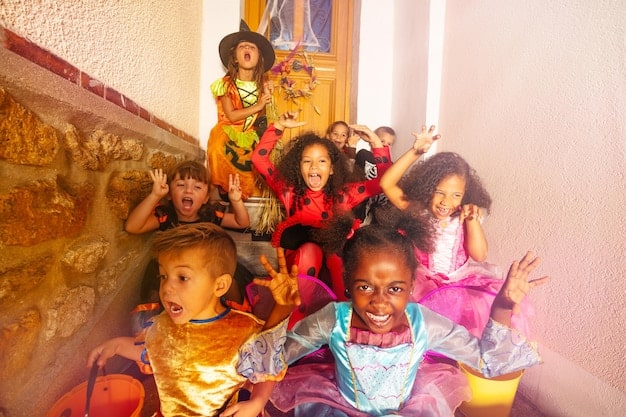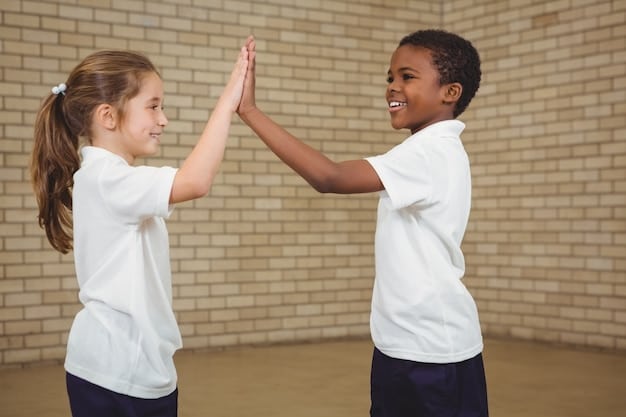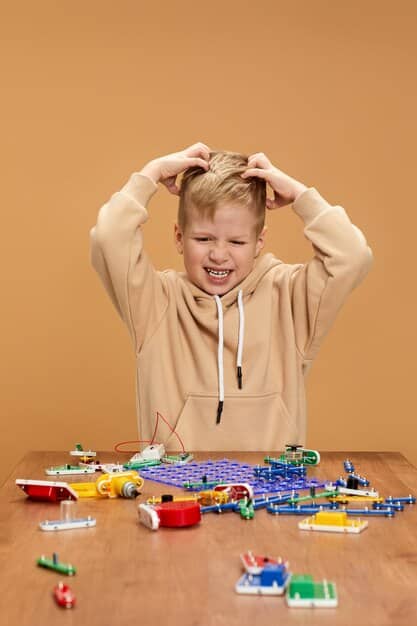How Play-Based Learning Enhances Social-Emotional Development in Preschoolers

Encompassing a holistic approach to early childhood education, play-based learning actively cultivates crucial social-emotional skills in preschoolers by fostering communication, collaboration, empathy, and self-regulation through engaging, child-led experiences.
The journey through early childhood is a period of remarkable growth, where fundamental skills for life are rapidly absorbed. Among these, social-emotional development stands as a cornerstone, shaping how children interact with the world and manage their feelings. But what if the most effective classroom isn’t a traditional one, but a vibrant space filled with blocks, dress-up clothes, and imaginary scenarios? This article explores precisely How Does Play-Based Learning Enhance Social-Emotional Development in Preschoolers? delving into the profound impact of playful exploration on young minds.
Understanding Play-Based Learning in Early Childhood Education
Play-based learning is more than just fun; it’s a pedagogical approach that recognizes play as a child’s primary mode of learning. In this environment, children are encouraged to explore, discover, create, and solve problems through various forms of play, guided by educators who facilitate their experiences rather than dictate them. This method stands in contrast to highly structured, didactic forms of instruction, emphasizing intrinsic motivation and active engagement.
The philosophy behind play-based learning posits that children naturally acquire knowledge and skills through self-directed activity. When preschoolers engage in play, they are not merely passing time; they are actively processing information, testing hypotheses, and developing complex cognitive frameworks. This makes play an incredibly rich context for learning, particularly for foundational social and emotional competencies.
The Foundational Principles of Play-Based Education
At its core, play-based learning is built upon several key principles that underscore its effectiveness in early childhood development. These principles ensure that the learning experience is not only enjoyable but also deeply enriching and developmentally appropriate for young children as they navigate their early years.
- Child-Led Exploration: Children choose their activities and resources, fostering independence and decision-making skills.
- Experiential Learning: Knowledge is gained through hands-on experience and direct interaction with the environment.
- Holistic Development: Addresses cognitive, physical, social, emotional, and creative aspects of development simultaneously.
- Scaffolding and Support: Educators observe, interact, and provide support when needed, extending learning opportunities without taking over.
Each principle contributes to creating an environment where social-emotional growth isn’t just an outcome, but an integral part of every playful interaction. Children learn to negotiate, share, empathize, and regulate their emotions in real-time, within authentic social contexts.
Moreover, the integration of free play and guided play is critical. Free play allows for spontaneous exploration, while guided play involves adults subtly introducing concepts or challenges to deepen the learning. This balanced approach ensures that children benefit from both unstructured creativity and intentional learning opportunities, laying a robust foundation for their social-emotional intelligence.
Cultivating Empathy and Perspective-Taking Through Play
One of the most profound ways play-based learning enhances social-emotional development is by providing fertile ground for the cultivation of empathy and perspective-taking. When preschoolers engage in imaginative scenarios, role-playing, or collaborative construction projects, they are inherently stepping into the shoes of others, understanding different viewpoints, and connecting with the emotions portrayed or experienced by their peers.
Consider a child pretending to be a doctor caring for a “sick” teddy bear. This seemingly simple act involves understanding the concept of illness, the role of a caregiver, and the emotions associated with both. They might consider how their patient feels, how to soothe them, and how their actions impact the “patient’s” well-being. Such imaginative play fosters a nascent sense of compassion and altruism, skills that are vital for healthy social relationships.
Role-Playing and Emotional Intelligence
Role-playing is a particularly powerful tool within play-based settings. When children assume different roles—be it a parent, a superhero, an animal, or a community helper—they begin to explore emotions, social norms, and decision-making from varied perspectives. This interactive engagement with different personas strengthens their emotional intelligence in several ways:
- Identifying Emotions: Children learn to recognize and name feelings as they are acted out by themselves or others.
- Understanding Causes of Emotions: They begin to link specific situations or actions to emotional responses (e.g., “The baby is crying because they are hungry”).
- Practicing Emotional Regulation: In a safe play environment, children can experiment with expressing emotions and finding constructive ways to manage them.
- Developing Empathy: By experiencing situations from another’s perspective, children develop a deeper understanding and appreciation of others’ feelings and experiences.
These experiences are not just theoretical; they are lived moments within the child’s world, making the lessons far more impactful than abstract instruction. The messy, often unpredictable nature of play itself provides authentic scenarios for children to practice these critical social skills in a low-stakes environment, where mistakes are opportunities for learning rather than sources of judgment.
Furthermore, narrative play, where children co-create stories, significantly enhances their ability to understand complex social dynamics. They learn to follow narratives, interpret social cues, and anticipate consequences, all of which are essential components of sophisticated social-emotional reasoning. This process also builds their capacity for emotional mirroring, laying the groundwork for genuine empathetic responses in later life.
Enhancing Communication and Collaboration Skills
Effective communication and the ability to collaborate are fundamental social skills, and play-based learning environments naturally facilitate their development in preschoolers. When children engage in shared play, they are constantly negotiating, sharing ideas, and working together towards common goals, whether it’s building a towering castle or orchestrating a complex pretend scenario.
Think about a group of children planning to build a fort. They need to decide on a design, allocate roles (“You carry the big box, I’ll hold up this blanket”), share materials, and resolve conflicts when ideas clash. These interactions require active listening, clear articulation of thoughts, and the willingness to compromise. Through this dynamic give-and-take, their communicative abilities are honed in a practical, meaningful context.
The Dynamics of Cooperative Play
Cooperative play, a specific stage of social play, is particularly instrumental in fostering communication and collaboration. In this stage, children work together on a shared activity, often with different roles, indicating a high level of social maturity for preschoolers. The benefits are extensive:
- Verbal and Non-Verbal Communication: Children learn to express their needs and desires verbally, and to interpret facial expressions, gestures, and body language from their peers.
- Negotiation and Compromise: Disagreements inevitably arise, providing invaluable opportunities to practice negotiation skills and learn the art of compromise.
- Problem-Solving in Groups: Working together to overcome challenges, such as a structure collapsing or a game not going as planned, teaches collective problem-solving.
- Perspective-Taking: To collaborate effectively, children must understand and consider the ideas and feelings of others.
These skills, developed through the organic interactions of play, are not merely academic; they are life skills. They prepare children for successful interactions in school, in future workplaces, and in personal relationships, emphasizing the importance of being part of a collective and contributing positively to a group dynamic.

Moreover, the less structured nature of play allows for repeated practice of these skills. Unlike formal lessons, where communication might follow a rigid format, play offers a flexible space for trial and error. Children can try different approaches to express themselves, see the immediate results, and adapt their strategies. This iterative process of communication and collaboration builds confidence and competence, creating fluent communicators and skilled team players from an early age.
Fostering Self-Regulation and Emotional Management
A critical component of social-emotional development is self-regulation – the ability to manage one’s emotions, thoughts, and behaviors in effective and healthy ways. Play-based learning environments inherently challenge and support preschoolers in developing these crucial self-regulatory capacities. When engaged in play, children encounter situations that naturally provoke a range of emotions, from excitement and joy to frustration, anger, or disappointment.
Imagine a child who wants a specific toy that another child is using. The immediate impulse might be to snatch it. However, within a play-based structure, guided by sensitive educators and peer interactions, the child learns to pause, consider alternatives (like waiting their turn or asking to share), and manage their impulses. This process, repeated countless times in varied scenarios, gradually builds their internal capacity for self-control.
Strategies for Emotional Management in Play
Play provides a safe arena for children to experiment with and refine their emotional management skills. The spontaneous nature of play often throws up unexpected challenges that require children to adapt and regulate their responses. Key strategies include:
- Delaying Gratification: Waiting for a turn on a swing or for a friend to finish with a toy teaches patience.
- Coping with Frustration: When a block tower repeatedly tumbles or a drawing doesn’t turn out as intended, children learn to persist, seek help, or try different approaches rather than giving up or lashing out.
- Managing Disappointment: Losing a game or not getting a preferred role in imaginative play encourages children to process and move past disappointment constructively.
- Handling Conflict Constructively: Disputes over rules or resources provide opportunities to practice negotiation and find mutually agreeable solutions without resorting to aggression.
Adult facilitators play a vital role here, not by solving every problem for the child, but by modeling appropriate emotional responses, suggesting strategies, and creating a supportive environment where children feel safe enough to experience and express intense emotions without fear of judgment. This guidance is essential for turning challenging moments into powerful learning opportunities for emotional intelligence.
Furthermore, the element of choice inherent in play-based learning contributes significantly to self-regulation. When children choose their activities, they are more invested and intrinsically motivated. This ownership reduces resistance and increases their willingness to engage with challenges, including managing their own emotional responses, reinforcing a sense of agency and control over their own learning journey and emotional landscape.
Developing Resilience and Problem-Solving Through Playful Challenges
Life is full of challenges, and developing resilience – the ability to bounce back from adversity – is a critical social-emotional skill. Play-based learning, by its very nature, offers a constant stream of playful challenges and minor setbacks that allow preschoolers to develop and strengthen their resilience and problem-solving abilities in a low-stakes environment. From a block tower collapsing to a game not going as planned, these moments are not failures but invaluable learning opportunities.
Imagine a scenario where a child is attempting to connect two pieces of a puzzle, but they don’t fit. Instead of an adult immediately intervening or providing the answer, the play-based approach encourages the child to persist, try different angles, or even step away and return with fresh eyes. This intrinsic struggle and eventual triumph (or the decision to seek help) builds their capacity for perseverance and equips them with confidence in their ability to solve problems independently.
Play as a Training Ground for Life’s Hurdles
Play contexts are replete with opportunities to practice coping mechanisms and develop adaptive strategies. The repeated cycle of encountering a problem, attempting a solution, facing a setback, and then trying again, is fundamental to building a resilient mindset. Specific ways play fosters these qualities include:
- Trial and Error: Children are free to experiment with different approaches without fear of judgment, fostering creativity in problem-solving.
- Adapting to Change: Play scenarios often evolve unpredictably, requiring children to adjust their plans and think on their feet.
- Overcoming Minor Frustrations: The frustration of a broken toy or a failed attempt in a game provides gentle exposure to disappointment and the chance to work through it.
- Independent Thinking: When adults avoid providing immediate answers, children are prompted to think critically and devise their own solutions.
These experiences teach children that mistakes are part of the learning process and that persistence often leads to success. The intrinsic motivation to master a task or achieve a play goal drives them forward, making the learning deeply personal and impactful. This proactive engagement with challenges within play builds an internal locus of control and a confidence that they can tackle future difficulties effectively.

Furthermore, collaborative play often involves group problem-solving, where children must combine their ideas and efforts to overcome a shared obstacle. This not only reinforces individual resilience but also teaches the value of collective effort and the distributed nature of intelligence. Learning to lean on peers and contribute to a group solution significantly bolsters both individual and social resilience, preparing them for complex real-world interpersonal dynamics.
Building Self-Esteem and Confidence Through Play
Self-esteem and confidence are vital aspects of social-emotional well-being, influencing a child’s willingness to engage with others, take risks, and believe in their own capabilities. Play-based learning environments are uniquely positioned to foster these qualities by providing ample opportunities for children to experience success, mastery, and a sense of agency within their activities.
When a child independently figures out how to stack blocks to create a stable tower, or successfully navigates a complex imaginary game with peers, they experience genuine accomplishment. These moments of success, chosen and driven by the child themselves, reinforce a positive self-concept and build confidence in their own abilities. It’s the intrinsic pride of “I did it myself” that fuels healthy self-esteem.
The Role of Autonomy and Mastery in Play
The very design of play-based learning supports the development of self-esteem through granting autonomy and fostering mastery. When children have the freedom to choose their activities and direct their own play, they are more engaged and invested, leading to deeper learning and a greater sense of accomplishment. Key contributing factors include:
- Choice and Control: Having agency over their play choices empowers children and validates their interests.
- Intrinsic Motivation: Performing activities for the sheer joy of it, rather than external rewards, cultivates genuine interest and persistence.
- Mastery Experiences: Repeated engagement with materials and concepts allows children to develop skills and achieve mastery, leading to feelings of competence.
- Safe Experimentation: The low-risk nature of play allows children to try new things, make mistakes, and learn from them without fear of failure or judgment, building resilience and confidence in their ability to overcome challenges.
Each small success, whether it’s solving a mini-crisis in a pretend scenario or finally connecting a tricky puzzle piece, chips away at self-doubt and builds a robust foundation of self-worth. This isn’t about inflated praise but about authentic accomplishment derived from meaningful, self-directed effort.
Furthermore, positive feedback from peers and educators during play reinforces these burgeoning feelings of self-esteem. When a child’s contribution to a group play scenario is valued, or their creative efforts are admired, it strengthens their sense of belonging and competence. These social affirmations, combined with personal victories in play, cumulatively build a positive self-image, equipping youngsters with the confidence necessary to navigate future social landscapes and academic challenges with a proactive and optimistic outlook.
| Key Aspect | Brief Description |
|---|---|
| 🎭 Empathy & Perspective | Role-playing and imaginative scenarios help children understand others’ feelings and viewpoints. |
| 🗣️ Communication & Collaboration | Cooperative play fosters negotiation, idea sharing, and teamwork in social settings. |
| 🧠 Self-Regulation & Emotion | Challenges in play provide opportunities to manage impulses, frustration, and disappointment. |
| 💪 Resilience & Confidence | Overcoming playful obstacles builds persistence, problem-solving skills, and self-esteem. |
Frequently Asked Questions About Play-Based Learning
Absolutely. Play-based learning provides foundational cognitive and social-emotional skills crucial for academic success. Children develop an investigative mindset, problem-solving abilities, and communication skills through play, which are directly transferable to formal learning, preparing them for literacy, numeracy, and scientific inquiry in a developmentally appropriate manner.
Educators act as facilitators, observers, and co-play leaders. They set up rich environments, introduce materials, ask open-ended questions, and model appropriate social behaviors. Rather than dictating play, they subtly extend learning by scaffolding children’s ideas, offering suggestions, and ensuring interactions are positive and productive, fostering deeper engagement and skill development.
Strong social-emotional development in preschoolers is linked to numerous long-term benefits, including better academic performance, healthier relationships, improved mental health, and greater overall life satisfaction. Children with well-developed social-emotional skills are better able to cope with stress, regulate emotions, and navigate complex social situations throughout their lives.
Yes, play-based learning can be highly beneficial for children with special needs. Its flexible, child-centered nature allows for adaptations and individualized support. Play provides a natural, low-pressure context for practicing social cues, language, and motor skills, fostering inclusion and enabling children to learn at their own pace and in ways that best suit their unique developmental paths.
Parents can support play-based learning by providing open-ended materials (e.g., blocks, art supplies, dress-up clothes), allowing for unstructured play time, and joining in their child’s play without directing it too much. Encouraging imaginative scenarios, asking open-ended questions, and observing their child’s interests can significantly enhance the learning and developmental benefits of home-based play.
Conclusion
The evidence overwhelmingly suggests that play-based learning is not just an enjoyable pastime but a cornerstone of holistic early childhood development, profoundly enhancing social-emotional growth in preschoolers. From fostering empathy and effective communication to building resilience and self-esteem, the organic, child-led nature of play creates an unparalleled environment for young children to acquire the skills necessary for navigating the complexities of their social world and emotional landscape. By embracing play as the primary medium for learning, we empower preschoolers to become confident, compassionate, and capable individuals, ready to thrive in school and beyond.